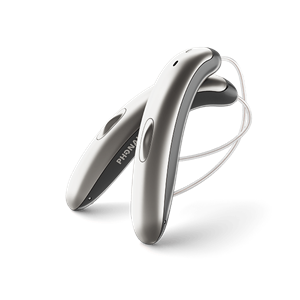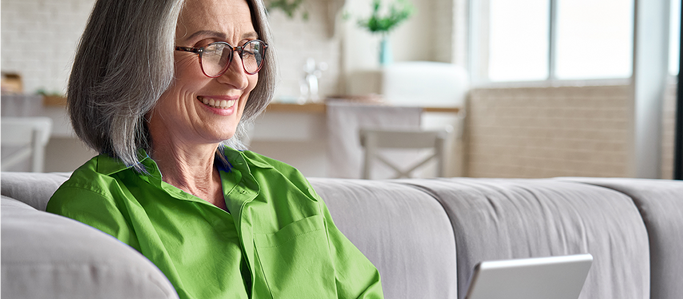Phone e mobile phones for Seniors: top solutions | Connect Hearing

Phone e mobile phones for Seniors: top solutions | Connect Hearing
11 min.
Publication Date: May 3, 2021
Today, people are keeping in touch like never before and the number of different devices, platforms, and apps is mind-boggling. But when it comes to our seniors, a lot of that is just so much noise. While some seniors love technology and want the latest gadgets, others are less comfortable with new digital devices and prefer to stay connected with familiar and trusted things, like land-line phones.
Wherever you or your senior fall on the spectrum, don’t worry — there are great solutions to keep in touch and to be sure that calls aren’t missed. It’s a matter of comfort, so let’s take a look at cell phones, land-line phones, and some phone accessories that enhance your senior’s ability to respond to calls and communicate with their loved ones.
What is the Best Cell Phone for Seniors
Cell phones have evolved from simple flip phones to mini-computers held in the palm of your hand. Today, the range of options can be overwhelming. You can even find cell phones for seniors that have Amazon Alexa, a virtual personal assistant, that allows you to call, set a timer, play music, or text loved ones all with a verbal command.
Smartphones for Seniors
Cell phones have been around for a while and many seniors are comfortable with their use and prefer to use a smartphone with its more extensive options. Whether your senior has an independent phone plan or is part of a family share plan, smartphones allow them a great deal of independence and can be extremely helpful if they choose to remain living on their own. These are some of the top smartphone functions most used (and appreciated) by seniors:
Ability to make emergency phone calls from anywhere (depending on service)
Facetime and Skype capabilities for talking with grandchildren by video
Texting with family and friends
Home security and environment, e.g., smart locks, smart thermostats, lights
The Weather App
Taking pictures and videos
Accessing the internet
GPS to navigate when walking or driving
Timers and Alarms to remind them of medications or doctors’ appointments
Puzzles, games, and books to keep their minds sharp
And with even more importance as healthcare becomes more app-based, as a way to monitor health and/or communicate with a healthcare provider
Simple Cell Phones for Seniors
Many cellphone manufacturers still offer flip phones as an option for seniors. They have several advantages: 1) they are less complicated to learn and to use, 2) they are less expensive to purchase (so no big deal if you lose one), 3) they hold their charge for days, 4) they cost less to operate with no or limited data fees, 5) most have cameras and texting available, and 6) many today have an SOS feature that allows your senior to signal in an emergency.
While there is a number on the market, look for one with large, easy-to-read keys, voice dialing, easy and straightforward navigation, and a speaker. Less complicated, but certainly powerful in their own right, simple cell phones, like flip phones, are all that most people really need anyway.
Home Phones for Seniors
Most seniors aren’t going to be ready to cut the landline cord; they simply want the reassurance of being connected to a phone system. And for emergencies and health scares, a landline makes perfect sense. They are connected to the 911 emergency system and most systems today can reverse trace to an address which can be critical during a health crisis (something that most cell phones can’t yet do).
So what are the best options for a landline phone for seniors?
Cordless vs Corded Phones
In the home phone market, today’s options include corded phones that have the benefit of not getting lost since they can’t be carried beyond their cord length. However, many people prefer cordless phones that can be more portable. As a good compromise, there are phone systems that can be purchased for the home that have dual phones — one corded and one cordless.
More importantly, there are specialty phones available today that can meet the needs of seniors, such as those experiencing declining hearing ability, with built-in functionality that goes beyond redial and hands-free mode, such as:
Emergency call functions with up to 5 emergency numbers that can be pre-programmed. If the first number is busy, the phone automatically dials the next number in succession until someone answers.
Volume amplification that renders clear, intelligible sound for up to +40 dB.
Incoming calls that can be programmed to be indicated by sound, vibration, and/or flashing light
Extra-large displays and dialing/function keys
Portable SOS buttons
Voice announcement for incoming calls
Phone Accessories for Seniors
Today, more and more seniors are living longer and choosing to age in place, meaning that their preference is to remain in their home as long as possible. In these situations, communication is one of the most important aspects for everyone’s assurance.
More now than ever, there are accessories available that increase someone’s ability to be notified of incoming calls as well as assist them in making outgoing calls. With safety at the top of everyone’s mind, consider an alerting system with a receiver that amplifies ringing or uses bright flashing lights to signal an incoming call. There are even bed vibrating systems that can wake someone when the phone rings as well as when the doorbell rings or the smoke detector is activated. Ultimately, the goal is to allow seniors to communicate in the way that works best for them.



